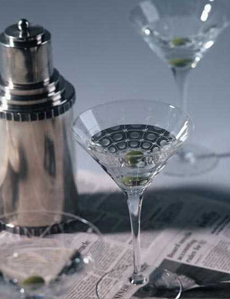
Mouth-blown crystal glasses in the Palace pattern by Artel bring even more grace and elegance to the always elegant martini. Photo courtesy Artel.
Last Updated March 2011 |
 |
Caring For Fine Crystal
A Thing of Beauty Can Be A Joy Forever
Just Follow These Care Tips
Fine crystal can easily last a lifetime—or two—if you take the proper care of it. To safeguard your crystal and to keep it looking its best, here are some basic rules from Artel, crafters of some of our favorite mouth-blown crystal.
Rinse Immediately, Then Hand Wash Crystal
- After using your precious crystal, rinse the glasses and carafes as soon as possible. Even if you don’t completely wash them until the next day, don’t let red wine or other liquids sit overnight in the crystal.
- Never clean crystal in a dishwasher. High heat and abrasive detergents can damage crystal. Glasses can knock against each other and chip, and delicate stems can break.
- Give your glasses the individual attention they deserve by washing each piece separately, by hand.
Hand Washing Technique
- Line the bottom of the sink with a rubber mat, a thick dishtowel or a washcloth. This will help avoid chipping and breakage, should the glassware slip while being washed.
- Use warm soapy water or a mild detergent. Wash each piece individually. Never soak crystal.
- Some wine connoisseurs find that soap leaves a residue that affects the taste of the wine. Others believe that extensive rinsing removes any residue. If your palate perceives soap residue, you can use washing soda (found in the detergent aisle) or baking soda to clean your glasses.
- To bring out more sparkle in your crystal, add a dash of ammonia to the dish detergent and the warm water rinsing solution.
- After washing, rinse the pieces in clean warm water and place them on a draining rack. Dry with a lint-free cloth. Some people prefer to use absorbent towels for the first dry and then shine the crystal with the lint-free cloth.
Trouble-Shooting
- To remove red wine or other stains, especially at the bottom of glasses or decanters, swirl a handful of uncooked rice in warm water with lemon juice or white vinegar. For tough stains use a denture cleaning tablet, but monitor the time according to package instructions and don’t leave it soaking any longer.
- To remove spots, try using vinegar on a lint-free cloth. Some retailers recommend using a spot of ammonia; however, use extreme caution with any harsh chemical. You may wish to try diluting the ammonia first, and use a cotton swab to apply it only on the affected area.
- For hard-to-reach spots, e.g. the bottom of narrow flutes or decanters, try using a chopstick covered with a soft cloth or dish towel.
- After all that hard work, do dry your crystal by hand with a lint-free cloth. Don’t let it air-dry. Dedicate a lint-free cloth to use only for drying crystal. You can purchase inexpensive microfiber wine glass towels that do the trick here.
Storing
When storing your crystal, make sure each glass is protected from knocking against another piece.
- Always store glasses right side up, to avoid damage to the rim.
If caring for crystal sounds like an effort in these convenience-seeking (and staff-limited) days, consider:
An exquisite piece of hand-blown crystal is a work of art, created by a craftsperson for you to enjoy for a lifetime. Its sparkle and ping will give you (and your guests) great pleasure every time you hold it. Crystal is the goblet of kings, and you have the ability to own and enjoy pieces just as beautiful.
READ ABOUT THE ISSUE OF LEAD
LEACHING INTO LIQUIDS
In Wine Glasses, Decanters & Other Lead Crystal |

|




